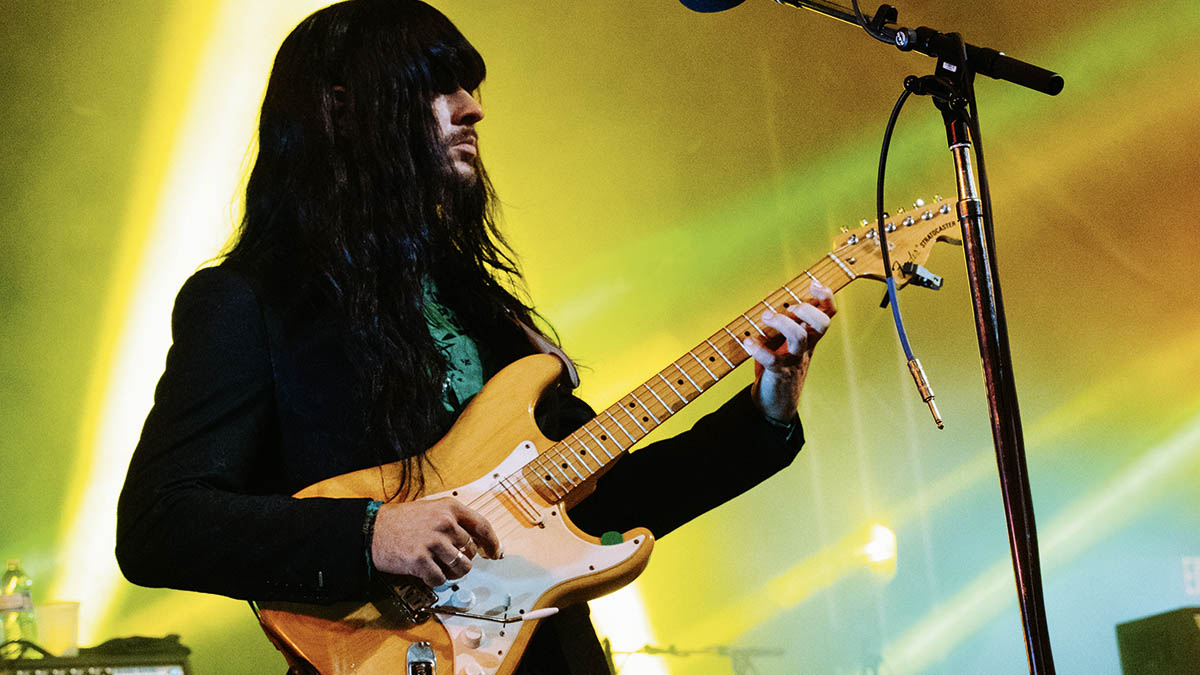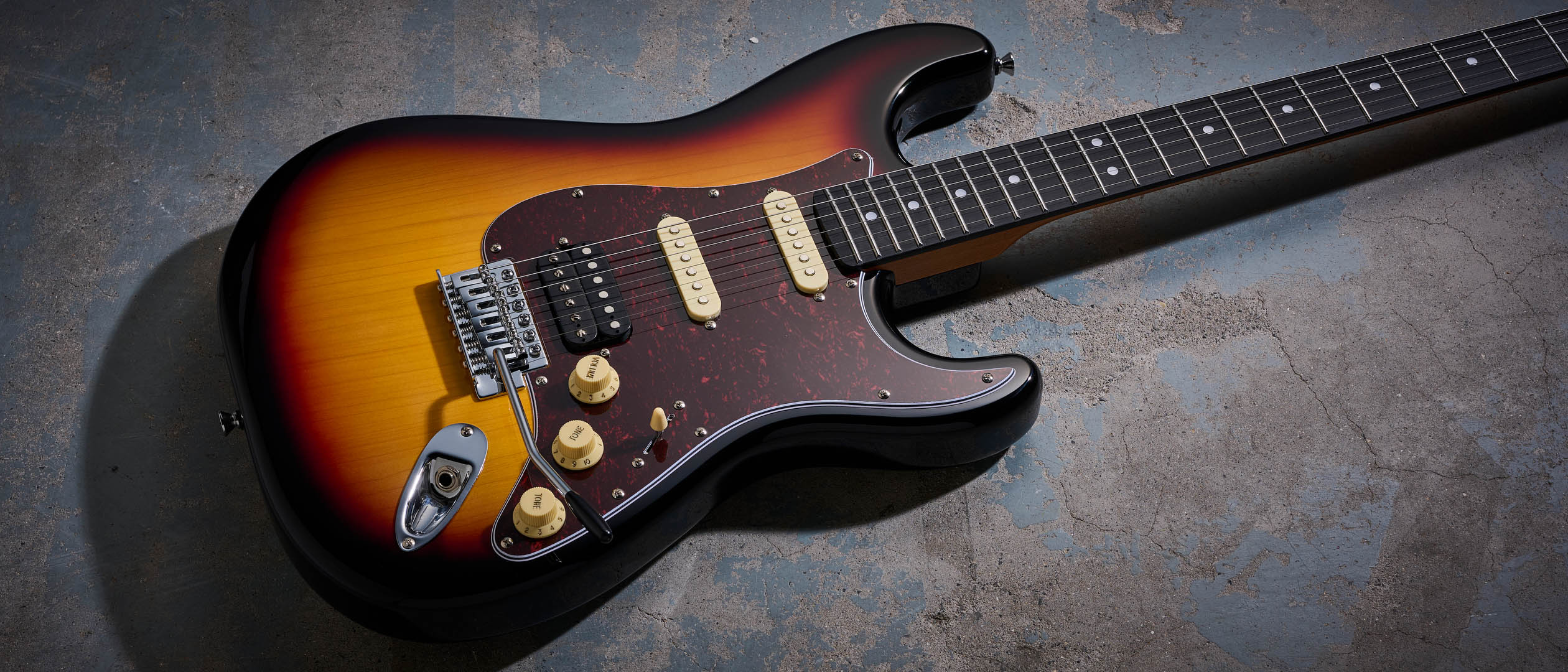Khruangbin’s Mark Speer: “Don't be afraid of space. You can spend your time either filling up every section of the sonic void, or you can embrace that space”
Speer tells us how chords, repetition and a healthy serving of reverb helps the eclectic, hypnotic and brilliant Texan trio open up pathways to transcendence

Mark Speer, guitarist for Texas trio Khruangbin, exhales smoke with a satisfied smile as he ponders the meaning of psychedelic music.
“People talk to me like I’m some psych-rock aficionado,” he says. “But our ‘psychedelic’ stuff comes from my deep, deep interest in dub reggae. Western ears hear the echoes and all the reverbs in dub and call it psychedelic, because we’re used to placing these components into that context. But it was never intended that way.
“Dub’s actually meant to be played underneath a Jamaican DJ chatting upon these rhythms, which are crazy sounds to keep the audience engaged when they’re drinking beer and smoking joints. It’s not really an LSD love-in.”
Khruangbin are not like other bands, and Speer is not like other guitarists. For a start, he has only one guitar, a 2001 US Fender Classic Series Strat. He has minimal interest in flashy solos, and his core heroes are old masters, far removed from rock orthodoxy.
Among them are Noel ‘Sowell’ Radics from legendary Jamaican band Roots Radics, Jacob Desvarieux from Guadeloupean zouk pioneers Kassav, and ska innovator Ernest Ranglin, widely credited with popularising the two- and four-beat chord accents that power that music’s signature skank.
So if the music of legendary fellow Texan Stevie Ray Vaughan is not for Speer, what about his fellow Houstonian, Billy Gibbons? He lights up: “I love Billy Gibbons! ZZ Top rules! That record Eliminator, with Sharp Dressed Man and Got Me Under Pressure, it’s killer – because it’s got electronic drums and pounding bass. It's like nothing else. The earlier stuff was just blues-rock, but by the 1980s they reinvented a genre. That album is amazing – I will die on that hill!”
As for Speer’s own little old band from Texas, a whole melting pot of influences goes into the hypnotic, globalista sound of Khruangbin (the name means ‘aeroplane’ in Thai). Formed by Speer, bassist Laura Lee and drummer Donald ‘DJ’ Johnson around 2011, the trio jammed in the Speer family barn, and were soon opening for artists including Bonobo and Massive Attack.
Get The Pick Newsletter
All the latest guitar news, interviews, lessons, reviews, deals and more, direct to your inbox!
Their 2015 debut LP, The Universe Smiles Upon Youd, introduced the wider world to their spacious, reverb-soaked instrumental cosmos, a place underpinned by Johnson’s spare, irresistible grooves, Lee’s clever bass and lulling vocal refrains and Speer’s tasteful, worldly guitar and liquid-gold tone.
More acclaimed LPs followed – 2018’s Con Todo El Mundo, 2019’s Hasta El Cielo and the brilliant Mordechai in 2020. That year, they also released Texas Sun, their EP with Grammy-winning Texan soul singer Leon Bridges.
“We opened for Leon back in 2018,” Speer says. “On that tour I’d go find a record store about a mile from the venue and buy as many 45s [vinyl singles] as I could, then backstage we had two portable record players, and we’d have little DJ sessions with these 7-inch singles. That’s where we really started vibing with Leon – hanging out, playing music, shooting the shit.”
The vibing inevitably led to music. The title track from Texas Sun was a Top 20 Rock Chart hit in the States, with over 100m Spotify hits to date. Now on the follow-up, Texas Moon, the trio’s eclectic sound palette continues to show Bridges’ smooth vocals in a new light, while he brings a neo-soul vibe to Khruangbin’s dreamlike and – to the rest of us – psychedelic offering.
I’ve met all kinds of musicians who can’t or won’t play the same thing for six minutes – they have to change, add more notes or solo, or they go crazy
Opening with the haunting Doris, Texas Moon magpies elements from Afrobeat (the utterly irresistible guitar hook in B-Side), D’Angelo-style neo-soul (the groovy Chocolate Hills, the brooding Father Father), and, in the yearning Mariella, some dusty Texan vibes, too.
“At the end of one of the sessions,” Speer recalls, “Leon was sitting on the edge of the couch, holding a guitar and singing songs that never made it onto his records, and I so got those bits, especially Chocolate Hills. It was just his vocal and two guitar chords, and I could hear where it should be going.
“I started making an arrangement with drums and bass – I never start with guitar; that was the last thing to go on. I’m a huge fan of [80s RnB group] Mtume – and my guitar part there’s actually a homage to [their 1983 hit] Juicy Fruit.”
For Father Father, Speer was so captivated by Bridges’ main melody he suggested they “just ride on this for the entire time, make it really hypnotic. I learned that from [Parliament/Funkadelic legend] George Clinton – you just play it over and over the same way until it’s hypnotising.
“I’ve met all kinds of musicians who can’t or won’t play the same thing for six minutes – they have to change, add more notes or solo, or they go crazy. But don’t come at me asking for non-hypnotic stuff! Other people do that way better than me and it’s not my bag. I’m gonna just stay hypnotic.”
Speer is 42 now. As a kid, he taught himself to play guitar, and later he’d vamp for hours on end with his church band, where he met bandmate Johnson.
Into the 2000s, he’d take any session gig he could to make rent – with gospel choirs, pickup bands in clubs, at ‘hip-hop jazz’ shows. He’d regularly do four-hour sets in Cajun joints with groups playing Zydeco, the lively, accordion-led brand of Creole dance music popular in East Texas and Louisiana.
As a listener, he’d head to record stores in Houston’s Indian district and dig out albums by superstar singers Lata Mangeshkar and MS Subbulakshmi. He fell for reggae, dub, the Afrobeat of Fela Kuti and Congolese guitarist Franco, and even had a brief dalliance with the prog of Gentle Giant, Soft Machine and the super-intense Eschaton. So when Khruangbin formed, he had a pretty unique approach.
Speer has unconventional means to get those uncommon tones. His sole Strat is fitted with DiMarzio Cruiser humbuckers in the neck and bridge, with TUSQ polymer bridge saddles/string trees adding tuning stability to the stock tremolo setup.
He favours flatwound strings, but for playability ditches the low E (.042) and substitutes it with the A (.032), then the D for the A, and so on, using a .010 for both the B and high E.
With much of his volume/tone management handled by judicious use of the pots on his Strat, Speer’s modest pedalboard includes a Boss DS-1 Distortion, Boss PH-3 Phaser and Strymon El Capistan echo. An expression pedal controls the Strymon’s repeats, from one-off slapback to long, dubby walls of echo.
His Cry Baby wah-wah is such an intrinsic part of his shimmering sound that it’s never turned off. “I started doing that in the mid-2000s,” he says, “when I got really into King Crimson and Santana.
“With the DS-1 all the way up and the tone [and distortion] off, I’d put on the neck or the bridge of the Strat, then park the wah [in the sweet spot]. I was trying to do these really long, sustained sheets of sound, that kind of Coltrane-esque approach – more like a synth or wind instrument, less than a guitar.”
This all goes to a Fender Deluxe Reverb amp, but not before passing through another essential bit of kit: “I always use the Electro-Harmonix Holy Grail reverb pedal, on the spring setting,” he reveals. “In the studio, we double that up with a real spring reverb on there. My love of reverb comes from my love for the sitar and the rebab, its African cousin. Some people tell me I use too much reverb, but I do what I do.”
In with the funky, world music-inspired lines, Speer favours tasty, jazzy chord voicings, with partial-chord licks adding extra interest.
“I love chords, dude!” he says. “I’ve learned how to do three-note chord melody stuff on the top three strings. At this point it’s an intuitive thing. I don't need to worry about the root, LL [bassist Lee] has got that covered. But I also want to learn how to make the chord sound tough.
“Take gospel music – a lot of times the chord might be major, but the choir’s singing something that’s not in that major scale, but it sure sounds good. Then, as soon as you add that [flat] seven to, say, a D major chord, it sounds like it wants to go back to G, right? But could just stay right there [on the D] forever. Then you gotta learn how to embellish that.”
With the trademark reverb an aural glue for Khruangbin’s sparse sound, Speer has a gift for sitting in Johnson and Lee’s groove, adding just the right adornments, letting the music hang.
His advice for a guitarist playing in a three-piece echoes that of the all-time great trio players, from Andy Summers to Eric Clapton. “Don't be afraid of space,” he says. “You can spend your time either filling up every section of the sonic void, or you can embrace that space.
“In our early stuff, it was pretty much just bass on the bottom, a cracking drum break then me playing on the top, and nothing in the middle. And that’s kind of counterintuitive to a lot of people – ‘You should get a keyboard player to fill up that middle!’ No – because then we’re gonna sound like everybody else! It was that space that made us sound like us.
“The three of you can go into the studio and layer everything, but then what’s gonna happen when you play live? Embrace what you can’t do – work with those limitations...”
- Texas Moon is out now on Dead Oceans.
Grant Moon is the News Editor for Prog magazine and has been a contributor to the magazine since its launch in 2009. A music journalist for over 20 years, Grant writes regularly for titles including Classic Rock and Total Guitar, and his CV also includes stints as a radio producer/presenter and podcast host. His first book, Big Big Train - Between The Lines, is out now through Kingmaker Publishing.
“My guitar tech ran in and said, ‘Hey, you want to meet Pete?’ I was too scared”: The Smithereens’ love affair with The Who goes way back – yet when guitarist Jim Babjak got the chance to meet Pete Townshend, he turned it down
“Every tour was the best I could have done. It was only after that I would listen to more Grateful Dead and realize I hadn’t come close”: John Mayer and Bob Weir reflect on 10 years of Dead & Company – and why the Sphere forced them to reassess everything










![John Mayer and Bob Weir [left] of Dead & Company photographed against a grey background. Mayer wears a blue overshirt and has his signature Silver Sky on his shoulder. Weir wears grey and a bolo tie.](https://cdn.mos.cms.futurecdn.net/C6niSAybzVCHoYcpJ8ZZgE.jpg)

![A black-and-white action shot of Sergeant Thunderhoof perform live: [from left] Mark Sayer, Dan Flitcroft, Jim Camp and Josh Gallop](https://cdn.mos.cms.futurecdn.net/am3UhJbsxAE239XRRZ8zC8.jpg)






